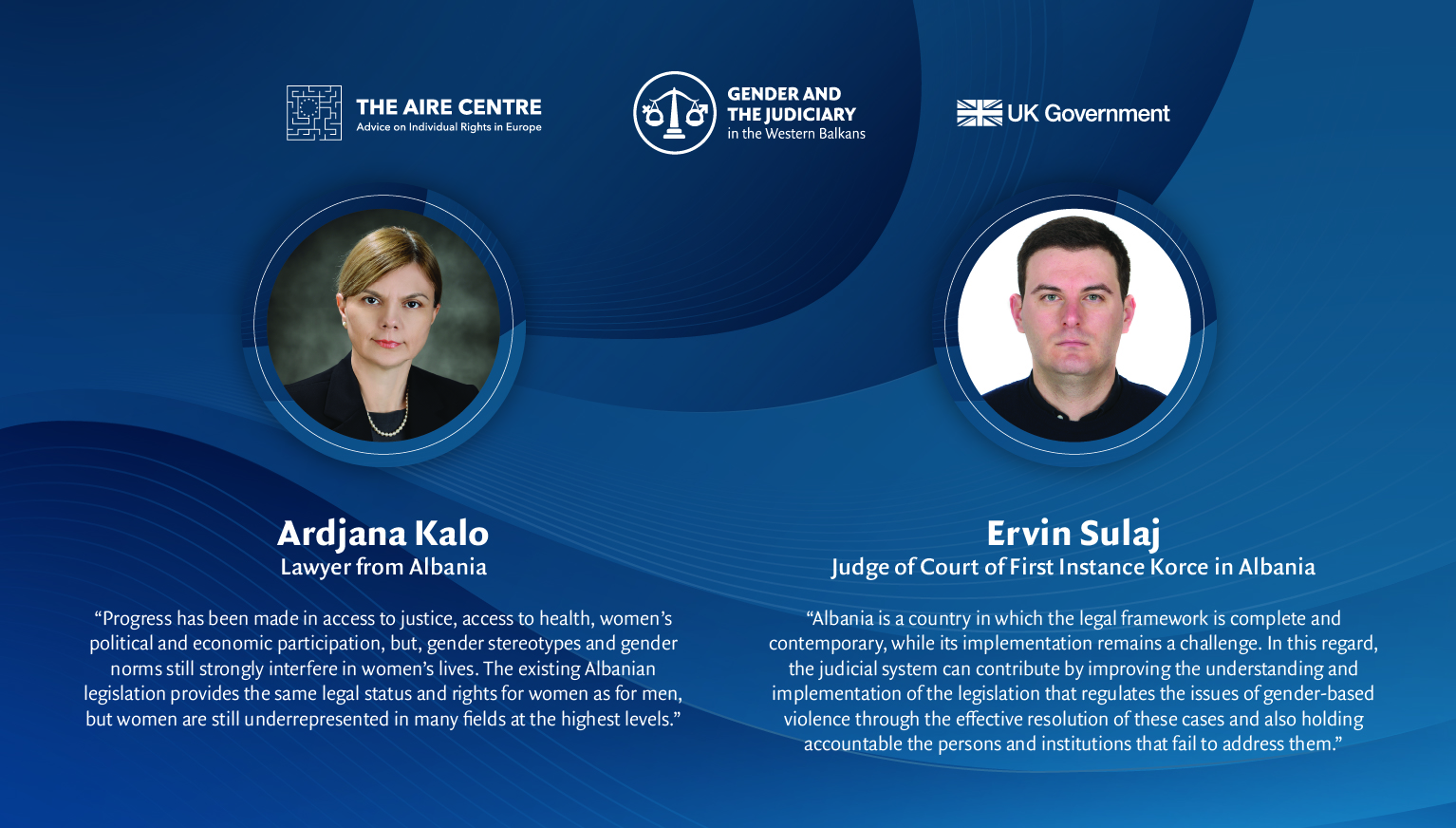Advancing Gender Equality in Albania — Experts on Combating Gender-Based Violence and Discrimination
26 May 2023
While the legal framework in Albania is comprehensive and contemporary, the challenge in addressing gender-based violence and discrimination lies in understanding and implementing these laws effectively. In fact, despite the existence of current laws in Albania proclaiming gender equality, the complete establishment of economic, social, and legal parity between women and men remains incomplete due to the prevailing influence of traditional norms and patriarchy. The upcoming Second Gender Equality and Western Balkans Judicial Forum presents an opportunity for the judicial system to contribute to addressing these issues. In this article, we explore the insights of Ervin Sulaj, a judge of the Court of First Instance in Korce, and Ardjana Kalo, a lawyer and judiciary expert from Albania, regarding gender-based violence and discrimination in the country.
Ervin Sulaj, judge of Court of First Instance Korce in Albania and member of the Gender Champions in the Judiciary Network (GCJ Network), emphasised that one of the main problems related to gender-based violence in Albania is the preparation of human resources within law enforcement institutions to understand and address the issue effectively.
“The judicial system can contribute by improving the understanding and implementation of the legislation that regulates the issues of gender-based violence through the effective resolution of these cases and also holding accountable the persons and institutions that fail to address them”, said judge Sulaj.

Ardjana Kalo, a lawyer from Albania and regional board member of the Gender Champions in the Judiciary Network (GCJ Network) highlights the barriers women face in achieving their full potential due to traditional and patriarchal societal norms, especially in rural areas.
“Progress has been made in access to justice, access to health, women’s political and economic participation, but gender stereotypes and gender norms still strongly interfere in women’s lives. The existing Albanian legislation provides the same legal status and rights for women as for men including under family, religious, personal status, and nationality laws as well as laws related to labour, property, inheritance, employment, access to credit, and owning or managing businesses or property. However, surveys show that women are underrepresented in many fields at the highest levels. For example, the existing legislation mandates equal pay for equal work, although many private employers did not fully implement this provision. In many communities, women experienced societal discrimination based on traditional social norms subordinating women to men”, explained Kalo.
Kalo also emphasises that although Albania has a legal framework aligned with international standards on violence against women, effective implementation remains a challenge. Access to civic rights and legal assistance is limited, and Kalo notes that economic empowerment of women is a pivotal first step.
“Aiming to make progress with the effective empowerment of women, the following known directions should be aimed: increase the level of women’s involvement in household decision-making and control over household assets, the decrease of GBV experiences, increase control over time and of the ability to redistribute the burden of care. Although the Albanian civil and family law, including matters of inheritance, recognize women’s equal right to property (including land), and recent improvements of legislation are approved regarding the registration of the spouses’ co-ownership title over the immovable property (including land), only a small percentage of women own immovable properties, because these laws are not implemented effectively and/or enforced and women continue to be marginalised. In addition, under Albanian laws, women can purchase and own property, however, these laws often remain ignored due to social and cultural norms; women are traditionally unable to represent the household in legal affairs and it is incredibly difficult for women to become property owners. In general, the economic violence against women is present to a considerable extent in Albania. Still, despite having a legal framework on violence against women and girls largely aligned with EU standards, implementation continues to be a challenge, confirmed by the existing low access to civic rights and legal assistance”, explained Kalo.
Both Sulaj and Kalo acknowledge the progress made in Albania’s legal framework and the efforts of independent institutions, such as the Ombudsman and Commissioner for Protection from Discrimination, in promoting and enforcing women’s human rights. However, they stress the importance of consolidating the implementation of laws through specialised training for judges and prosecutors.
As the Second Gender Equality and Western Balkans Judicial Forum approaches, it presents an opportunity for stakeholders in Albania to further discuss and address the challenges surrounding gender-based violence and discrimination.
Second Gender Equality and the Western Balkans Judicial Forum, a key regional event about judicial response to gender-based violence and discrimination, is only six days away. The Forum is organised by the AIRE Centre with the support of the Government of the United Kingdom, and it aims to tackle the question of how the judiciary can address various types of gender inequalities in the Western Balkans. This high-profile event will bring together key judicial actors from region and beyond, including representatives from European Court of Human Rights, representatives from important regional judicial and other state institutions, academics, and NGOs.